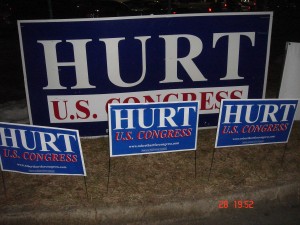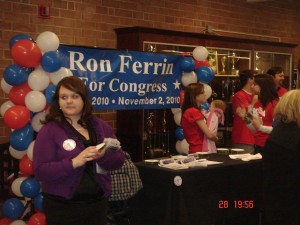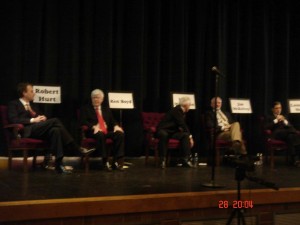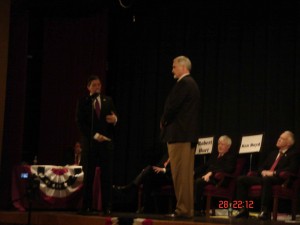On the Front Lines of the Tea Party Insurgency
The debate over which Republican should run against Tom Perriello, began with a prayer, provided by the leader of the Virginia Tea Party Patriots:
Lord help these candidates tonight… Give them clarity in their answers. That you will give them wisdom, and that the crowd is able to discern their answers Lord. We thank you for the opportunity to meet tonight, and thank your blessings for this evening, in your name we pray.
These candidates will need all the help they can get. Amongst the seven candidates who want the job: an establishment-backed candidate, a few Tea Party insurgents, individuals touting Glenn Beck’s favorite book (The 5,000 Year Leap), and a candidate threatening a third party challenge. The opening invocation should have added: ‘Lord, help this district solve the existential crisis of the Republican Party.’
 Republicans are excited to remove Parriello. Eager volunteers came by Brookville High School earlier and marked every open space of grass or dirt with a lawn sign. A political consultant once remarked to me that, “lawn signs are useless, they don’t change anyone’s mind and only activists care about them.” Whoever put the three smaller signs in front of the one giant sign didn’t get the memo.
Republicans are excited to remove Parriello. Eager volunteers came by Brookville High School earlier and marked every open space of grass or dirt with a lawn sign. A political consultant once remarked to me that, “lawn signs are useless, they don’t change anyone’s mind and only activists care about them.” Whoever put the three smaller signs in front of the one giant sign didn’t get the memo.
Inside, each candidate set up a table, creating a bazaar of democracy with activists crowding the hallway, handing out pamphlets in every direction. The upside of a fractured party is that everyone is excited to fill the vacuum. A twenty-something asked me to sign a petition to get his candidate on the ballot. He tried to make his case, but I had some reservations:
 “He’s for the constitution, and really about getting back to core principles,” he argued.
“He’s for the constitution, and really about getting back to core principles,” he argued.
I asked him: “How is that different from any of the other candidates?”
“Well there are some personality differences too.”
This open field was not predestined. It was the result of a perfect storm of questionable decisions from the higher echelons of Virginia’s Republican Party, and a groundswell of Tea Party activism. Virgil Goode was the Republican incumbent who lost in 2008. His decision not to run again meant the primary would be competitive, but when Eric Cantor effectively endorsed state senator Robert Hurt, conservative activists felt slighted.
Feda Morton, another candidate running for the seat, expressed the view that conservatives would have preferred a convention to select their nominee. This would have allowed the Tea Party to feel that they had a stake in the process. Instead, the party decided to select its nominee through a primary, “The primary favors an incumbent… in Virginia, anybody can vote in the primary... there is a rumor mill now that Perriello is trying to get behind Hurt because they perceive him to be the weakest candidate." Rumors or not, opening up the primary has left bad blood, “Now you have a possibility that the Tea Party people will not support Robert Hurt [if he wins the nomination]. They didn't get their convention... It’s caused a lot of animosity.” She suspects that the party supported the method with the best chance to select the most moderate nominee.
 The most unhelpful thing about a Tea Party debate is how easy the questions are. It is already difficult to keep seven candidates straight; it’s nearly impossible when the question asked is “what do you love most about America?” and each candidate’s answer is a variant on the theme of freedom. For “what is the biggest threat facing America?” everyone agreed it was ‘the current administration’ and usually placed Iran in the #2 slot. Finally, when asked “is the Constitution under attack?” there were two successive answers that amounted to a 'Yes' and a 'Yes.' The third debator mixed it up a bit: answering in the affirmative before asking the audience how many members of congress they thought followed the Constitution. (Ron Paul and Jim DeMint were the only answers they had.)
The most unhelpful thing about a Tea Party debate is how easy the questions are. It is already difficult to keep seven candidates straight; it’s nearly impossible when the question asked is “what do you love most about America?” and each candidate’s answer is a variant on the theme of freedom. For “what is the biggest threat facing America?” everyone agreed it was ‘the current administration’ and usually placed Iran in the #2 slot. Finally, when asked “is the Constitution under attack?” there were two successive answers that amounted to a 'Yes' and a 'Yes.' The third debator mixed it up a bit: answering in the affirmative before asking the audience how many members of congress they thought followed the Constitution. (Ron Paul and Jim DeMint were the only answers they had.)
Some audience members were excited to hear why each candidate loved the Constitution, but others became numb. A local pastor in the audience named Joshua expressed ambivalence with the lineup: “I’m not buying the prepared speeches… it’s all slogans.”
 There truly are some differences between the candidates, but this was only clear when candidates could question each other. A revealing exchange captured the tension of Tea Party absolutism against Republican pragmatism. Laurence Verga asked Robert Hurt why he supported tax credits for businesses. Hurt argued that he was working with Governor McDonnell to help small businesses. Verga’s stance against tax credits was clear, “it should be our money in the first place!”
There truly are some differences between the candidates, but this was only clear when candidates could question each other. A revealing exchange captured the tension of Tea Party absolutism against Republican pragmatism. Laurence Verga asked Robert Hurt why he supported tax credits for businesses. Hurt argued that he was working with Governor McDonnell to help small businesses. Verga’s stance against tax credits was clear, “it should be our money in the first place!”
While many of the candidates' positions don’t leave much wiggle room for debate, some don’t see themselves as unelectable. I spoke to candidate Mike McPadden. He presents himself as a constitutional strict-constructionist -- albeit one who would like to weaken the interstate-commerce and ‘general welfare’ clauses of the constitution. McPadden believes his message has resonance outside the debate, and that the issue of liberty is a universal concern.
While all of the participants -- even those closely linked to the Tea Party movement -- wanted the GOP nomination, there was also a potential third-party challenge from candidate Jim McKelvey. McKelvey kept a copy of the constitution in his breast pocket during the debate, and made unhappy comments about Scott Brown. He is threatening to run as an independent. In his own words, “I’m not looking to be electable.” On the possibility of splitting the conservative vote and keeping Perriello in Congress, “I stand on my principles. I do this because I am scared for the future of the country.” One of the debate organizers came over, and politely informed McKelvey that he won the unscientific straw poll, by what sounded like 60%. UPDATE: McKelvey did win the straw poll, but not by 60%. He won 70 votes and secured 28.5%. The results are available here.
Outside the debate, I spoke with Mark Lloyd, the organizer of the Lynchburg Tea Party, and not a fan of the Republican establishment. Lloyd was frustrated with how my line of questioning assumed there was a distinction between the tea partiers and the Republican party: "You're differentiating between Tea Party and Republicans, and yes we're different because the GOP establishment wants to keep their power. But when you look at conservatives... conservatives really do speak the same language. The problem is that you got Democrats, and then you have RINOs… and they are all in the Washington D.C. bubble."
A question about the economy however, brings a very different sort of answer, “It’s not so bad here, but the South Side’s bad, 20% unemployment in some areas.” Lloyd then explained how a lot of traditional Virginian businesses, in textiles, tobacco and furniture, haven’t been faring that well. The advocate of the Tea Party took on a sober tone.
Impassioned pleas about the 10th amendment can appear peculiar to an outsider, but when businesses are leaving, Washington is spending, and the Republican Party doesn’t seem to be listening, who can really blame them?
That same weekend, Tom Perriello said that Senate needed to “gets its head out of its rear end” on the climate change bill. His spokeswoman argues that his strong positions make him electable. It’s not without precedent, George W. Bush campaigned for reelection saying, “you may not always agree with me, but at least you know where I stand.” Liberals are already getting interested in his reelection, and statements like this will keep his name in the news.
 It’s unclear how enthusiastically conservatives will unite to support Hurt if he wins the nomination, especially when candidates such as Feda Morton can quickly lay out a conservative case against him, “He's got a hell of a voting record, high taxes, domestic partners, and the mandatory vaccination for the HPV virus!” It’s clear these activists don't stand with the establishment; what’s unknown is how far they will go to stand by their principles.
It’s unclear how enthusiastically conservatives will unite to support Hurt if he wins the nomination, especially when candidates such as Feda Morton can quickly lay out a conservative case against him, “He's got a hell of a voting record, high taxes, domestic partners, and the mandatory vaccination for the HPV virus!” It’s clear these activists don't stand with the establishment; what’s unknown is how far they will go to stand by their principles.

